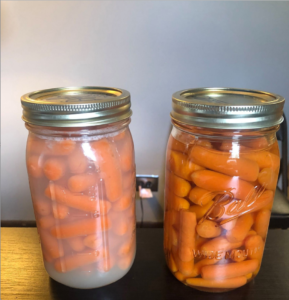Just Because It Seals, Doesn’t Mean It’s Safe
go.ncsu.edu/readext?708265
en Español / em Português
El inglés es el idioma de control de esta página. En la medida en que haya algún conflicto entre la traducción al inglés y la traducción, el inglés prevalece.
Al hacer clic en el enlace de traducción se activa un servicio de traducción gratuito para convertir la página al español. Al igual que con cualquier traducción por Internet, la conversión no es sensible al contexto y puede que no traduzca el texto en su significado original. NC State Extension no garantiza la exactitud del texto traducido. Por favor, tenga en cuenta que algunas aplicaciones y/o servicios pueden no funcionar como se espera cuando se traducen.
Português
Inglês é o idioma de controle desta página. Na medida que haja algum conflito entre o texto original em Inglês e a tradução, o Inglês prevalece.
Ao clicar no link de tradução, um serviço gratuito de tradução será ativado para converter a página para o Português. Como em qualquer tradução pela internet, a conversão não é sensivel ao contexto e pode não ocorrer a tradução para o significado orginal. O serviço de Extensão da Carolina do Norte (NC State Extension) não garante a exatidão do texto traduzido. Por favor, observe que algumas funções ou serviços podem não funcionar como esperado após a tradução.
English
English is the controlling language of this page. To the extent there is any conflict between the English text and the translation, English controls.
Clicking on the translation link activates a free translation service to convert the page to Spanish. As with any Internet translation, the conversion is not context-sensitive and may not translate the text to its original meaning. NC State Extension does not guarantee the accuracy of the translated text. Please note that some applications and/or services may not function as expected when translated.
Collapse ▲We are well into canning season, and many people are looking for answers to their food preservation troubleshooting questions. A common assumption is that as long as the jar seals, it will be preserved and safe to consume. This is not always the case.
Although a good seal is important for a safe canned product, proper processing technique is arguably the most important step. Sealing without proper processing can lead to microorganism growth, spoilage, and possible harmful toxin formation.
The photo below shows canned carrots; the jars were hot packed the exact same way, but only the one on the right was properly processed at the correct time and pressure as directed by a tested canning recipe. Once the hot carrots and water were packed into the jar on the left, the jar sat at room temperature and sealed from the pressure change from the heat of the contents. In this instance, you can see the cloudy signs of spoilage in the jar that was not processed correctly, however, there are not always visual signs when a canned product is unsafe for consumption. Open kettle, oven canning, and other not-recommended forms of canning may give these, or similar unsafe results.
The pathogen of concern when canning is Clostridium botulinum, which could cause botulism- a potentially deadly form of food poisoning. These spore forming bacteria can survive harmlessly in soil and water and are very prevalent on the surface of most fresh food surfaces. As an anaerobic bacteria, Clostridium botulinum spores only become dangerous in environments with an absence of oxygen, making them harmless on fresh food surfaces.
In certain conditions, C. botulinum spores can produce vegetative cells that rapidly multiply and produce a deadly neurotoxin within 3 to 4 days of growth. Ideal conditions for C. botulinum growth consist of: a moist, low acid food, a temperature between 40℉ and 120℉, and less than 2 percent oxygen. You can see by these criteria that improperly processed home canned goods exhibit the perfect environment for C. bot growth!
While the jar on the left does not show growth of colorless, odorless C. bot spores, it does show strong evidence of spoilage organisms that may still be harmful if consumed. Don’t let the fear or inconvenience of proper processing of canned goods be a reason to compromise the safety of your friends and family. Just because it seals, doesn’t mean it’s safe!
For questions about proper canning methods and procedures, contact Emily Troutman at emily_troutman@ncsu.edu or 828-764-9480.

Canned Carrots




